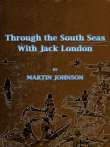قراءة كتاب Through the South Seas with Jack London With an introduction and a postscript by Ralph D. Harrison. Numerous illustrations.
تنويه: تعرض هنا نبذة من اول ١٠ صفحات فقط من الكتاب الالكتروني، لقراءة الكتاب كاملا اضغط على الزر “اشتر الآن"

Through the South Seas with Jack London With an introduction and a postscript by Ralph D. Harrison. Numerous illustrations.
href="@public@vhost@g@gutenberg@html@files@43812@[email protected]#GroupofRoasWomen" class="pginternal" tag="{http://www.w3.org/1999/xhtml}a">Group of Roas Women, Solomon Islands
INTRODUCTION
Accounts of dare-devil exploits have always been read with deep interest. One of the salient features of human nature is curiosity, a desire to know what is being said and done outside the narrow limits of one's individual experience, or, in other words, to learn the modes of life of persons whose environment and problems are different from one's own environment and problems. To this natural curiosity, the book of travel is particularly gratifying.
But when we add to the fact that such a narrative treats of races and conditions almost unknown to the inhabitants of civilised countries the consideration that those voyageurs to whom the adventures fell are men and women already prominently before the public, and so deserving of that public's special confidence, the interest and value of such a work will be seen to be extraordinarily enhanced.
The cruise of Jack London's forty-five-foot ketch Snark was followed eagerly by the press of several continents. The Snark alone was enough to compel attention, but the Snark sailed by Jack London, a writer of world-wide celebrity, was irresistible. The venture caught the world's fancy. Periodicals devoted columns to a discussion of the Snark and her builder, and to the daring crew who sailed the tiny craft for two years through the South Seas.
When it became known that such a voyage was in contemplation, hundreds of persons wrote to Mr. London, begging that he allow them to accompany him. On the other extreme, they were legion who threw up their hands in horror at the mere suggestion. The belief was widespread, and was, indeed, almost universally expressed, that the famous writer and his fellows were setting out on a cruise from which there would be no return. As an instance of the capriciousness of things maritime and the fallibility of human judgment, it is interesting to reflect that the Snark, a ten-ton yacht, the stanchness of which was greatly doubted, travelled her watery miles without mishap, and is still afloat, while the


